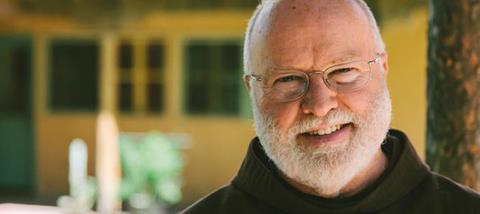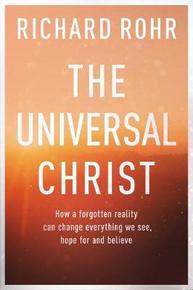
You say your new book The Universal Christ can be described as a sequel to your book on the Trinity - The Divine Dance. Do you think some readers are going to find the universalist thoughts explored within this new title quite challenging?
Well, that’s undoubtedly true – because it’s not the way many reading it have been taught. So, unless they’re willing to really do a major mind-shift, some of the teaching in my new book will seem wrong, even heresy. It really isn’t though, not at all. It’s simply an idea and a way of thinking that I’m convinced consciousness wasn’t ready for until our time.
I hope I make the case within the book that these views are very scriptural – many of us were just not brought up to think that way, that’s all. The message of the book isn’t changing a single doctrine of the Church. We’ve had years of deconstruction of the scriptures – what isn’t true, what isn’t right. All that does is create cynics – people who say things are meaningless. This book and its teachings are at the opposite end of the spectrum: saying that everything is filled with meaning and everything is connected.
The book opens with an account of an ordinary London underground journey where the writer has a vision of Christ radiating from all her fellow passengers. You speak in the book of how ‘Jesus’ + ‘Christ’ reveals the divine wholeness at the heart of things. What do you mean by that?
Well, I think it’s fair to say that the normal everyday mind – which is practical, problem solving, linear, dualistic – can’t see it and won’t see it. Seeing this connectiveness is so dependent upon a transformation of consciousness, which we call the contemplative mind.
I think Paul is calling the mind of Christ an inclusive mind not an exclusive mind, you don’t start with what you can eliminate but you start with what you can include, and the more you can include the more you transcend to higher levels of awareness.
This view is closely linked with our teaching on contemplation. I know that makes it even less accessible to a lot of people who want to use their ordinary thinking cap – right and wrong, all or nothing – but I hope many will find the ideas bring them a greater sense of freedom.
What would you say to someone who wants that freedom of thought but has grown up being taught a dualistic way of thinking?
Well those are the people who tend to be what we call the ‘first adopters.’ If they’re sincerely searching for inner freedom – and I don’t mean freedom in the cheap American way, I mean spiritual freedom – they come around the quickest. Maybe without even knowing it. Because their motivation is at a higher level.
We've created a filter of fear in too many Christian environments for hundreds of years – teaching conformity, group think, hierarchy telling us what to think. So, we’ve got our work cut out for us, but when you do find those people who are sincerely seeking truth and inner freedom, they’ll be the first adopters. And even there, what we’re talking about in this book must almost first invade the unconscious, there must be a ‘yes’ at the unconscious level before you start processing it at the conscious level. If there’s a lot of fear, and a lot of resistance at the unconscious level, the mind will probably throw these challenges to its thinking out. And I can’t change that. It’s all grace. I can’t lead anybody to this by logic or reason or proof; there is no proof.
It’s the first time you’ve written about the person of Jesus Christ. Why do you think it’s taken until now to address this most fundamental part of Christianity?
You know the easiest answer to that is the Hubble Telescope! It sends back pictures every day from an ever-expanding universe. Whether we are conscious of it or not, cosmology is deeply affecting the psyche, and I think for many people it’s destabilising.
Many of us grew up with this very static, very limited view of the world with ourselves placed right at the centre. But we know we’re not the centre of anything – the universe is still expanding, at a faster and faster rate. No scientist would disagree with this – and it’s almost like theology now needs to quickly catch up. We need to allow our minds to make space for a God at least as big as the universe – not a tiny God who’s easily offended. The mind is just insisting on a God who is gigantic, who is momentous, who is the Christ!
So, people need to be ready to accept mystery?
Yes, and that’s the hardest part. The notions of a tiny God cannot keep up with what is actually happening in our expanding universe, that was expanding for 13.7 billion years before Christianity ever came around, before the Bible was ever written.
I can’t prove this but I’ve often wondered whether the incoherence between our tiny God and our expanding universe is the reason there are so many mentally and emotionally disturbed people in our societies today. There is no coherence to our thinking, no meaning to the universe, without a huge God who is bigger than all and in all. As soon as we allow ourselves to see that there is meaning in
everything, we find greater levels of understanding. And hallelujah, that’s what quantum physicists are now proving. What we use to think was an airy fairy, new age statement is now the Gospel! Now we know that Jesus’ prayer in John 17, that all may be one, has been answered! It all is one! And many of us are ready to have the eyes to see it.
The Universal Christ by Fr Richard Rohr (SPCK) will be released in the UK next month. Premier Christianity is committed to publishing a variety of views and opinions. We will be publishing a response to Fr Richard's book in the coming weeks





























